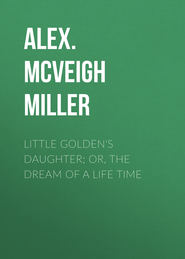По всем вопросам обращайтесь на: info@litportal.ru
(©) 2003-2024.
✖
Lancaster's Choice
Автор
Год написания книги
2018
Настройки чтения
Размер шрифта
Высота строк
Поля
"Perhaps," said Lancaster, dryly; but his heart began to beat. Would Lady Lancaster really bring Leonora into the drawing-room? Something assured him that if she did it would only be to humiliate and snub her. He read this intuitively in Lady Adela's supercilious expression. His heart swelled with hot resentment. He rose hurriedly.
"She shall not send for her," he said; but the earl's daughter answered, with ill-concealed malice:
"She has already done so."
"Then she shall not come. I will myself forbid it," he exclaimed; but even as the words left his lips, he paused and stood for a moment speechless. The drawing-room door had opened just then, and Leonora West stood just inside of it, hesitating on the threshold.
CHAPTER XXXIII
"Oh, Lord Lancaster, you are too late! She is come now!" cried Lady Adela, for her glance, too, had fallen on the graceful, hesitating figure. She saw with inexpressible chagrin that Leonora was in simple but faultless costume. Her dress, of some soft, shining, thin, black material, was of stylish and fashionable make, and her white shoulders and arms gleamed marble-white through the thin folds. She had arranged all her rich tresses of chestnut hair in loose puffs and waves on the top of her head, and fastened a single spray of starry white jasmine flowers at the side. Some of the same sweet, fragrant blossoms fastened the full ruff of white crêpe lisse at the round, white throat, and constituted her only adorning. Her white arms and dimpled wrist, left bare by the elbow-sleeves of her dress, were more beautiful in their shapely grace than Lady Adela's ten-button gloves and diamond bracelets.
"She has had the impertinence to get herself up in full evening dress, the minx!" the earl's daughter muttered, almost audibly; and then she uttered a suppressed exclamation of annoyance, for Lord Lancaster had started for her side, and was making his way rapidly across the room to the door.
"He has left me for her!" was her jealous, angry thought, and a sudden hatred for Leonora entered her heart.
Meanwhile, Lord Lancaster had reached the spot where the girl was standing, with a slightly heightened color on her face, but with that quiet air of self-possession she habitually wore. She was not at all overwhelmed by the honor Lady Lancaster had thrust upon her, but she was a little indignant at the dowager, who purposely left her standing there alone, taking care that De Vere did not see her and go to her rescue.
But she forgot her nephew sitting in full view across the room, or she thought that he would not forsake the side of Lady Adela. What was her amazement when she saw him standing by the girl's side, saw the fair face lifted to his with a grateful smile!
"Lady Lancaster has commanded your humble servant to appear before your highness and execute divers pieces of music," she was saying, mischievously, when the dowager pounced down upon them like a hawk, and, with an angry aside to her nephew, bore Leonora off to the piano.
The next minute De Vere came forward gladly. By this time every one was looking, yet he was in nowise intimidated.
"Oh, Miss West, how glad I am to meet you, and looking as charming as ever, too!" in an audible aside, while his face beamed with delight. Leonora drew her hand rather hastily away.
"I am not here on equal terms, please remember that," she said, turning around and sitting down on the piano-stool. "It is my lady's orders that I shall amuse the company."
"Then I shall turn your music—may I?" he entreated.
She gave a careless assent, and looked at the great pile of music.
"Perhaps you will select something to play," she said; and seeing, without turning her head, that Lancaster had gone back to his seat by the earl's daughter.
"He is afraid she will be jealous of me," the girl said to herself, with the least little curl of her red lip.
"Can you play this?" De Vere inquired, placing a simple little song before her.
"Yes; but I do not want a song, please. Give me something by Mozart or Rossini—something brilliant. I am on exhibition, you see," saucily.
"Can you really play Mozart?" he whispered to her as he searched for the music.
"Oh, yes; and Beethoven, too. I am fond of music, so I have studied it a great deal. I can play almost anything," she said, carelessly, as she took the piece he handed her—an exceedingly brilliant and difficult piece by Mozart, and ran her quick eyes over it.
She placed the music before her, and struck the first notes. The hum of voices in the room grew instantly still. No one spoke while that grand torrent of music rose and fell on the charmed air, as those slim white fingers of Leonora swept the echoing keys. They forgot the performer for a little, even as she forgot them. Her cheeks glowed, her eyes sparkled. While she played she remembered nothing but the harmonies that were shed from her subtle finger-touches. The art of the grand composer charmed her, and when she paused at last, it was with a low sigh of blended pain and pleasure.
"Brava!" said De Vere, bending over her, and she smiled.
"Have I done well? It is because I have a passion for music, and have given my soul to it."
CHAPTER XXXIV
It was quite likely that De Vere would see the difference between his lowly born love and the real ladies in the room, as Lady Adela had said, but that he would be disenchanted was quite another matter. There certainly appeared to be no chance of it now. He was charmed with the splendid musical talent she had evinced. He felt a glow of pride in her as if she belonged to him already.
"You have done splendidly," he whispered, as he hung delightedly over her. "There is not a lady in the room who can do half so well."
"Thank you," she replied, demurely. "But you had better give me another piece. I am here to play, not to talk."
He longed to say, "Give me the right to place you on an equality with these women as my wife," but he was afraid to venture yet. Something in her cold, careless manner forbade the thought. He said to himself that he must wait until he knew her longer and had wooed her more. She was not to be lightly won, this beautiful gifted girl. She was proud and sensitive. He would have to bide his time.
So with a smothered sigh he placed before her several pieces, and while she played he stood silently by her side, turning the leaves of her music, and gazing into the beautiful, soulful face, proud and glad in the privilege he enjoyed of being so near her.
When she had played several instrumental pieces brilliantly, he placed another song before her.
"Let me hear if you can sing as well as you can play," he pleaded.
She glanced at the song. It was Longfellow's "Bridge."
"Yes, I will sing it," she said; and again there fell a hush of silence as the sweet and well-trained voice filled the room with its melody. De Vere was fain to acknowledge that she sung as well as she played.
When she had sung the last line she looked up into his face.
"Will you play or sing something now while I rest?" she asked.
"I never knew how unfortunate I was before in having no talent for music," he said, ruefully. "I should like to oblige you so much, but I have no more voice than a raven, Miss West. I will call Lancaster. He can sing like a seraph."
"Oh, pray don't!" she cried; but he had already turned around.
"Lancaster," he called, "won't you come and sing something while Miss West has a breathing-spell?"
He came forward at once. He thought it would be very pleasant to displace De Vere for a moment, to stand by her side and watch her exquisite face and the glancing white hands as they moved over the shining pearl keys.
"Pray do not rise," he said, bending over her, hurriedly; "I will sing, but I shall want you to play my accompaniment."
She bowed silently, and he selected a piece of music and placed it before her. It was that beautiful song, "My Queen."
"He is going to sing to Lady Adela," the girl said to herself, a little disdainfully, but her touch was firm and unfaltering as she struck the chords while Lord Lancaster sung:
"Where and how shall I earliest meet her?
What are the words she first will say?
By what name shall I learn to greet her?
I know not now, but 'twill come some day.
With the self-same sunlight shining upon her,
Streaming down on her ringlets' sheen,
She is standing somewhere, she I would honor,
She that I wait for, my Queen, my Queen!
I will not dream of her tall and stately,











